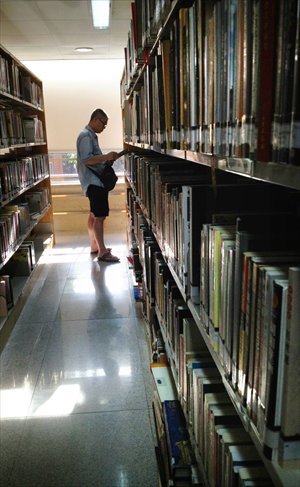HOME >> ARTS
Borrowing books online
By Wei Xi Source:Global Times Published: 2012-7-31 20:25:03

Qingfanqie.com, launched by Shenzhen-based Green Tomato Culture Media Company, and jieshuwang.com, or Wendy, of Beijing Joywendy Education, are currently two of the leading online libraries in China testing out the idea of borrowing books over the Web.
Set of rules
Launched in 2010, Qinfanqie currently provides services in 27 cities around the country.
Wendy, a newly established, Beijing-based company will open its first branch in Wuxi, Jiangsu Province.
Both companies boast a diverse collection that amounts to over 100,000 books.
To borrow a book from these websites, users create an account and register their address. After browsing through the options, customers add selections to their shopping cart. Both Qingfanqie and Wendy offer free delivery in cities they have a service branch.
Qingfanqie requests a deposit from customers ranging from 110 yuan ($17.29) to 510 yuan. The amount paid groups customers into clothing sizes, from M to XXL.
M users can borrow books in the M category, while XL users can borrow books from M to XL, a larger selection. Deposits are returned when a customer closes his or her account.
Wendy asks for an annual registration fee, which ranges from 59 yuan to 999 yuan per year. Different levels determine the quantity of books a customer can borrow.
"The most expensive fee is 10 yuan per book, which is not much when you factor in a person's transportation cost to the library and the beverage purchased along the way," Luo Bo, marketing manager of Wendy told the Global Times.
Wendy also provides custom-tailored services for families and companies. By analyzing personal preferences and budget size, staff at Wendy can compile a list of recommended books.
New model
According to Luo, Wendy started this business after founder Guo Lei, who worked in the educational sector, realized the large demand for books among children. But consistently buying books is expensive and wasteful.
"Though e-books have a large market, it has its disadvantages in the reading mode, limitations on facilities and cost," Luo said. "There are free downloads, but high-demand books are hard to find for free."
Zhang Lijuan, vice president of Qingfanqie, said that she used to be active in groups that promote reading, but such activities only benefit a limited group.
"We thought about combining the convenience of the Internet with the model of a library," said Zhang, who believes that a fast pace of life inhibits many people from having time to visit libraries. "As e-commerce develops and we purchase more things online, why not borrow books online?"
Without a domestic or international model to base the business on, Zhang made step by step preparations. Currently, most of Qingfanqie's income comes from advertising and providing services for enterprises.
Qingfanqie places ads for other companies on book covers and the Internet. According to Zhang, these ads are not just business promotions. They contain creative ideas, and will not annoy readers.
Zhang explained that aside from simply providing books, Qingfanqie provides a service to help enterprises with branding and molding reading environments. For example, they have designed reading spaces in hotels.
For Wendy, Luo said their company is supplemented by renting fees, ads and government support.
Community of customers
There are risky factors online libraries need to take into account, like a small customer base or the potential for borrowed books to be damaged or lost.
Zhang said they operate on a trust system, and do not dole out harsh punishments. If a customer loses a book, he or she simply purchases the same edition as a replacement.
If a reader does not buy the same book, then the fee is double the book's retail price. If a child damages a book, the parents are responsible for repairing it.
But what if a reader returns a fake or copied rendition of a book? Zhang said Qingfanqie has its own method to determine if the book returned is the authentic one or a copy.
"If we discover that the returned book is fake, we will take the money from the customer's deposit." Zhang said few cases have occurred so far. "Our readers take good care of the books. Some even put covers on," she said.
For the sustainability of the business, Chen Shaofeng, vice dean of Institute for Cultural Industries, Peking University, said two things must be addressed.
First, China's modern youth no longer read as much. Second, readers are increasingly interested in e-books. Purchasing books online is not that expensive.
"With several hundred yuan, a reader can buy enough books to last a year," he told Beijing Business Today.
Zhang's opinion differs. "Some people like reading and some do not, some prefer buying books and others prefer borrowing from the libraries. Online libraries provide an alternative way to read," she said.
Posted in: Books